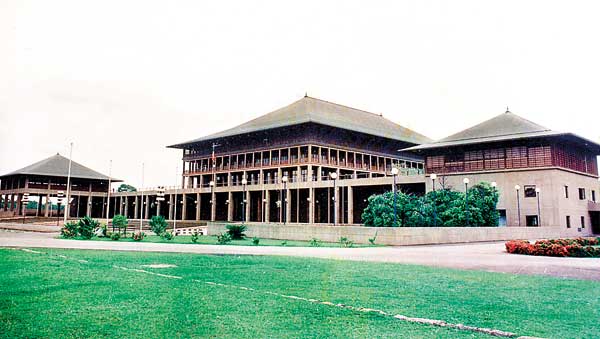By Faiszer Musthapha
Deputy Minister of Technology and Research

_DM-88.jpg)
The recent political developments in the country have triggered a debate among the people on the potential adverse consequences of the 13th Amendment to the Constitution of Sri Lanka.
The 13th Amendment to the Constitution of Sri Lanka is a sequel to the Indo-Sri Lanka Accord signed in July 1987. It was a genuine effort on the part of India to bring about a cessation of hostilities between the Government of Sri Lanka and the LTTE terrorist group. The intentions of both governments are made clear in the preamble: “Attaching utmost importance to nurturing, intensifying and strengthening the traditional friendship of Sri Lanka and India, and acknowledging the imperative need of resolving the ethnic problem of Sri Lanka, and the consequent violence, and for the safety, wellbeing and prosperity of people belonging to all communities of Sri Lanka…….”
However, over the period of past 22 years since signing of the Accord and introduction of the 13th Amendment to the Constitution, the people belonging to all communities of Sri Lanka have not been benefited.
As very correctly analysed by Mr. Gotabaya Rajapaksa, Secretary, Ministry of Defence and Urban Development, “the 13th Amendment and the CFA didn’t serve the people of Sri Lanka. Instead, they facilitated interests of various other parties, including the LTTE. Interestingly both supported the separatist cause,”
Further, it would be seen that the 13th Amendment: inter-alia
-
impedes the post-conflict reconciliation process,
-
obstructs the implementation of the government’s social welfare measures,
-
poses a threat to safeguarding Sri Lanka’s territorial integrity
Firstly, it could be seen that The 13th Amendment had delayed the implementation of the government’s national policies on social and economic empowerment of the people. There is a likelihood of anti-government politicians and political parties resorting to delaying tactics taking cover under the 13th Amendment, purely for political gain, disregarding the benefits that the people would accrue from being socially and economically empowered.
Secondly, it is observed that the provisions of the 13th Amendment which stipulates the “Province” as the unit of devolution impedes the successful implementation of the reconciliation programmes.
_DM-8(16).jpg)
The Provincial Council system is a fetter to bridging the gap between communities which is an essential ingredient in nation building and reconciliation. The recently concluded Eastern Provincial Council election proved beyond doubt that this system resulted in the polarization of people on ethnicity and religion.
The Lessons Learnt and Reconciliation Commission (LLRC) has stressed the need to empower the local government institutions to ensure greater participation of people at the grass-root level. In this regard it states that “it is also imperative that the lessons learnt from the shortcomings in the functioning of the provincial councils system be taken into account in devising an appropriate system of devolution that addresses the needs of the people.”
The LLRC recommendation clearly underlines that the present system of devolution has its flaws. Hence the need to introduce an, “appropriate system of devolution”.
Thirdly, determining the greater unit of province as the unit of devolution poses a threat to the territorial integrity of the country mainly due its size in relation to the rest of the country.
We should recall that the Chief Minister of the North and East amalgamated Provincial Council, made a futile attempt to declare unilateral independence. With changing attitudes in the global arena and the LTTE rump striving hard to achieve the realization of Prabhakaran’s dream the threat to territorial integrity looms large as long as the province remains ‘the unit of devolution. This situation is further aggravated by the presence of a provision in the 13th Amendment to amalgamate provinces by way of a referendum decided upon by the people of such provinces totally disregarding the wishes of the people in the rest of the country.
Another significant adverse characteristic of the provincial councils system is its impact on the country’s economy. As many economists had pointed out it is a ‘White Elephant’. The provincial council system has created a huge drain on the fiscal strength of the country. A cost benefit analysis would show that the benefits are relatively much lower than the costs.
Over a period of ten years there had been a fourfold increase of recurrent expenditure in the provincial councils. It has increased from 28,856 million in 2000 to 111,336 million in 2009 (Source: Central Bank).
Therefore, it is clear that the 13th Amendment has failed to deliver the expected results. On the contrary it has been an obstacle to alleviating poverty and implementing social welfare programmes, a source for the compartmentalization of people on racist lines, a white elephant devouring the country’s financial resources. An impediment to fostering communal and religious harmony, and above all, a threat to safeguarding the territorial integrity of the country.
In view of the foregoing, it has become imperative to repeal the 13th Amendment and enact new legislation to ensure that the sovereignty of the nation and the territorial integrity of the country are safeguarded whilst providing equal opportunities to all, fostering communal harmony and promoting a Sri Lankan identity.
In this regard the best option would be to give effect to President Mahinda Rajapaksa’s statement stressing the fact that “there are no majority or minorities in this country but only Sri Lankans of different ethnic origins and subscribing to different religious belief” . Therefore a new constitution ensuring people’s rights and equal opportunities should be introduced irrespective of whether a citizen is a Sinhala, Tamil, Muslim, Burger, Malay or of any other race and whether one is a Buddhist, Hindu, Muslim, Christian or a person of any other religious belief. The government has the will, the power and the able guidance of a charismatic leader in President Mahinda Rajapaksa to usher in a new prosperous Sri Lanka with a strong
Sri Lankan identity.

_DM-88.jpg)
_DM-8(16).jpg)
